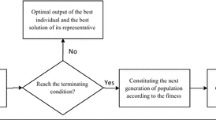Abstract
The demand for high-speed automatic train operation (ATO) system brings new opportunities and challenges for the high-speed railway field. The requirements of energy consumption, punctuality, safety and smoothness are also increasing, especially the research on energy saving of high-speed trains ushers in a broader development space. This paper proposes quantitative functions of four energy-saving performance indexes and the multi-objective optimization model of train operation curve considering the characteristics of high-speed train ATO system. An energy-saving optimization method of train operation curve based on Glowworm Swarm Optimization (GSO) algorithm is proposed. The simulation results show that the train operation using the high-speed train operation curve optimization method based on the GSO algorithm can save about 16.9% of electrical energy consumption per kilometer compared with that by other optimization algorithms, which verifies the effectiveness of the method. The result from this paper provides theoretical support for practical application.
Access this chapter
Tax calculation will be finalised at checkout
Purchases are for personal use only
Similar content being viewed by others
References
Xie, T., Wang, S., Zhao, X., Zhang, Q.: Optimization of train energy-efficient operation using simulated annealing algorithm. In: Li, K., Li, S., Li, D., Niu, Q. (eds.) ICSEE 2012. CCIS, vol. 355, pp. 351–359. Springer, Heidelberg (2013). https://doi.org/10.1007/978-3-642-37105-9_39
Bai, Y., Ho, T.K., Mao, B.: Energy-efficient locomotive operation for Chinese mainline railways by fuzzy predictive control. IEEE Trans. Intell. Transp. Syst. 15(3), 938–948 (2014)
Zhou, L.S., Tong, L. (Carol), Chen, J.H., et al.: Joint optimization of high-speed train timetables and speed profiles: a unified modeling approach using space-time-speed grid networks. Transp. Res. Part B 97, 157–181 (2017)
Liu, S., Cao, F., Xun, J., Wang, Y.: Energy-efficient operation of single train based on the control strategy of ATO. In: IEEE International Conference on Intelligent Transportation Systems, pp. 2580–2586 (2015)
Miao, Z., Qi, Z., Zi, X.Z.: A study on energy-saving optimization for high-speed railways train based on Q-learning algorithm. Rail Transp. Econ. 41(12), 111–117 (2019). (in Chinese)
Tang, T., Xun, J., Cao, F., Wang, Y.H., Soo, S.: Research on energy-efficient driving strategy in Beijing Yizhuang Line. J. Beijing Jiaotong Univ. 40(4), 19–24 (2016). (in Chinese)
Hao, G., Zhang, Y.D., Jin, G., Zhi, Z.: Optimization of energy-efficient train operation based on dynamic programming approach. J. China Railw. Soc. 42(08), 76–84 (2020). (in Chinese)
Liang, Z.C., Wang, Q.Y., He, K.: Energy saving control of electric multiple unit train based on maximum principle. J. China Railw. Soc. 37(10), 16–25 (2015). (in Chinese)
He, Z.Y.: Research on automatic train operation algorithm based on non-parametric iterative learning control. J. China Railw. Soc. 42(12), 90–96 (2020). (in Chinese)
Li, K.P., Gao, Z.Y.: Optimal method of energy saving train operation for railway network. J. Transp. Syst. Eng. Inf. Technol. 9(04), 90–96 (2009). (in Chinese)
Bhanu, P., Krishnanand, K.N., Debasish, G.: Glowworm swarm-based optimization algorithm for multimodal functions with collective robotics applications. Multiagent Grid Syst. 2(3), 209–222 (2005)
Keskin, K., Karamancioglu, A.: Application of firefly algorithm to train operation. In: 2016 IEEE In: 8th International Conference on Intelligent Systems (IS), pp. 692–697 (2016)
Huang, Z.X., Zhou, Y.Q.: Using Glowworm swarm optimization algorithm for clustering analysis. J. Convergence Inf. Technol. 6(2), 78–85 (2011)
Kaipa, K.N., Ghose, D.: Glowworm swarm optimization: algorithm development. In: Glowworm Swarm Optimization. SCI, vol. 698, pp. 21–56. Springer, Cham (2017). https://doi.org/10.1007/978-3-319-51595-3_2
Acknowledgment
The authors wish to convey their sincere sense of gratitude to the support of the National Key Research and Development Program of China under Grant 2016YFB1200602-34.
Author information
Authors and Affiliations
Editor information
Editors and Affiliations
Rights and permissions
Copyright information
© 2021 Springer Nature Singapore Pte Ltd.
About this paper
Cite this paper
Li, W., Zhao, S., Li, K., Xing, Y., Liu, G., Liu, J. (2021). Energy-Efficient Operation Curve Optimization for High-Speed Train Based on GSO Algorithm. In: Li, K., Coombs, T., He, J., Tian, Y., Niu, Q., Yang, Z. (eds) Recent Advances in Sustainable Energy and Intelligent Systems. LSMS ICSEE 2021 2021. Communications in Computer and Information Science, vol 1468. Springer, Singapore. https://doi.org/10.1007/978-981-16-7210-1_12
Download citation
DOI: https://doi.org/10.1007/978-981-16-7210-1_12
Published:
Publisher Name: Springer, Singapore
Print ISBN: 978-981-16-7209-5
Online ISBN: 978-981-16-7210-1
eBook Packages: Computer ScienceComputer Science (R0)




